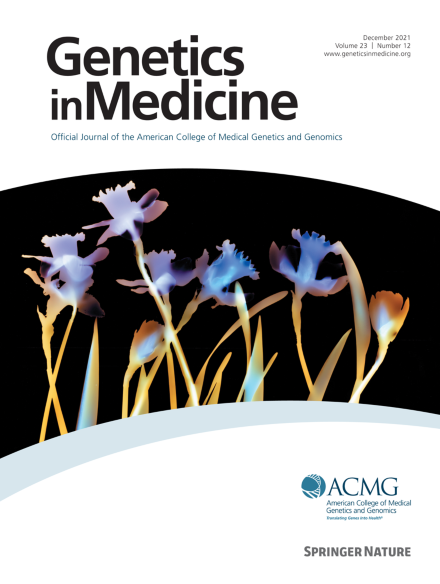先天性糖基化疾病的生化检测:美国医学遗传学和基因组学学院(ACMG)的技术标准。
IF 6.6
1区 医学
Q1 GENETICS & HEREDITY
引用次数: 0
摘要
先天性糖基化障碍(CDG)是一个庞大且不断扩大的疾病群体,具有各种临床表现,并与170多个基因有关。单独来看,cdg是罕见的;然而,由于临床表现的可变性,以及需要通过多种途径进行诊断的多种检测策略,真实发病率可能被低估。近年来,随着高通量分子检测的出现和基因发现技术的改进,CDGs的检测也在不断发展。检测糖基化蛋白缺陷或酶缺乏症的生化检测在诊断患者中仍然起着关键作用,并且通常需要这两种检测方式来完成诊断。以改善糖基化为目标的新兴治疗方法需要可靠和可重复的生化试验来进行治疗监测、剂量调整和避免剂量相关的副作用。为了保持临床敏感性和特异性,并确保进行复杂生化测试的实验室的可重复性,美国医学遗传学和基因组学学院制定了以下技术标准。本文章由计算机程序翻译,如有差异,请以英文原文为准。
Biochemical testing for congenital disorders of glycosylation: A technical standard of the American College of Medical Genetics and Genomics (ACMG)
Congenital disorders of glycosylation (CDG) are a large and continually expanding group of disorders that present with a variety of clinical findings and have been linked to over 170 genes. Individually, CDGs are rare; however, the true incidence may be underestimated because of the variability of the clinical findings, and the multiple testing strategies needed to diagnosis them across multiple pathways. Testing for CDGs has evolved over recent years with the availability of high-throughput molecular testing and improved gene discovery techniques. Biochemical testing to detect defects in glycosylated proteins or enzymatic deficiency still plays a critical role in the diagnosis of affected individuals, and both testing modalities are often required to finalize a diagnosis. Emerging therapeutic approaches targeting improvements in glycosylation require reliable and reproducible biochemical testing for therapeutic monitoring, dose adjustment, and avoidance of dose-related side effects. To maintain clinical sensitivity and specificity and to ensure reproducibility across laboratories performing complex biochemical testing, the American College of Medical Genetics and Genomics has developed the following technical standard.
求助全文
通过发布文献求助,成功后即可免费获取论文全文。
去求助
来源期刊

Genetics in Medicine
医学-遗传学
CiteScore
15.20
自引率
6.80%
发文量
857
审稿时长
1.3 weeks
期刊介绍:
Genetics in Medicine (GIM) is the official journal of the American College of Medical Genetics and Genomics. The journal''s mission is to enhance the knowledge, understanding, and practice of medical genetics and genomics through publications in clinical and laboratory genetics and genomics, including ethical, legal, and social issues as well as public health.
GIM encourages research that combats racism, includes diverse populations and is written by authors from diverse and underrepresented backgrounds.
 求助内容:
求助内容: 应助结果提醒方式:
应助结果提醒方式:


